Selling on Etsy can feel like playing by someone else’s rules.
Between rising fees, strict policies, and limited control over your storefront, many sellers eventually start looking for more freedom — and better ways to grow their business on their own terms.
The truth is, you don’t have to stay locked into a marketplace that puts limits on your brand. There are powerful alternatives that let you take back control, reduce costs, and create a store that’s fully yours.
I’ve spent years helping creators and small business owners do exactly that – from launching their own shops with WooCommerce to selling digital products with Easy Digital Downloads.
Along the way, I’ve tested and worked with many platforms designed to support independent sellers.
In this guide, I’ll share the top Etsy alternatives to help you keep more of your profits, connect directly with customers, and build a business that grows with you.
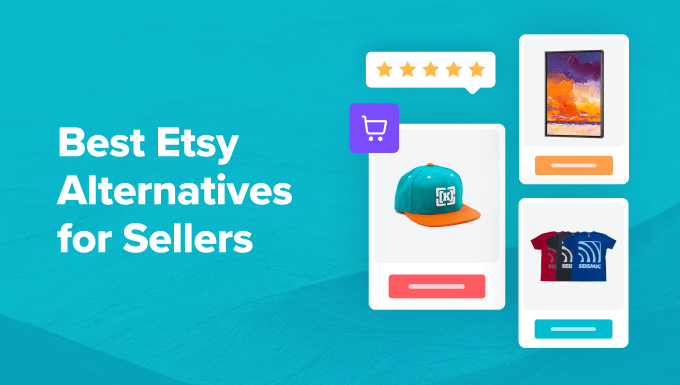
My Verdict: Best Etsy Alternatives for Sellers
In a hurry? Here’s a quick overview of the best Etsy alternatives for sellers.
| # | Platform | Best For | Price |
| 🥇 | WooCommerce | WordPress + growth potential + full customization options | Free (extensions/themes may cost) |
| 🥈 | Easy Digital Downloads (EDD) | Selling digital products directly on your WordPress site | Free +$99.50/yr |
| 🥉 | Shopify | All-in-one solution + beginners | $39/month |
| 4 | eBay | Auction feature + collectibles & rare items | Varies based on sales and fees |
| 5 | Wix | Beginners + integrating with multiple marketplaces | $16/month |
| 6 | Amazon Handmade | Largest audience reach + fulfillment option + lower seller fees | Varies based on sales and fees |
| 7 | Big Cartel | Creatives & artists + affordability | Free (limited features) |
| 8 | Redbubble | Print-on-demand products + fulfillment | Free to list |
| 9 | BigCommerce | Comprehensive features + scalable + beginner-friendly | $29.95/month |
Why Look For an Etsy Alternative?
Etsy is a popular marketplace for handmade and vintage items, but many sellers eventually outgrow the platform. While it is easy to set up, you have very little control over your business, and the costs can add up quickly.
Here are the main reasons why sellers look for Etsy alternatives:
- Rising Transaction Fees: Etsy raised seller transaction fees from 5% to 6.5%. This cuts directly into your profit margins.
- High Competition: The marketplace is flooded with mass-market products that aren’t actually handmade. This makes it hard for genuine creators to stand out.
- Lack of Control: You cannot customize your store design or branding. Your shop looks exactly like everyone else’s.
- You Don’t Own Your Data: Etsy controls the customer relationship. You cannot build your own email list or market directly to your buyers to generate repeat sales.
- Risk of Suspension: Relying on a third-party marketplace is risky. If Etsy changes its rules or flags your account by mistake, your entire business could disappear overnight.
By moving to your own platform, you gain full ownership of your store. You can customize the design, set your own rules, and keep more of your hard-earned money.
How I Tested and Reviewed Etsy Alternatives
To give our readers the most reliable recommendations, I tested popular Etsy alternatives by creating demo online stores with them. During my testing, I particularly focused on the following criteria:
- Ease of Use: I assessed how simple it is to navigate the platform, set up a store, and manage inventories, focusing on whether it suits beginners.
- Customization Options: I evaluated the flexibility each platform offers in terms of store design and branding.
- Transaction Fees: I compared the fee structures of each platform, including listing fees, commission rates, and transaction fees. This way, I could ensure the platform offers good value for money.
- Scalability: I looked at how well the platform can grow with your business, including whether it supports multiple products, increased traffic, and expanding product lines.
- Feedback: I read feedback from other users to see how they have experienced the platform and if there are any common issues.
- Reliability: Whenever possible, I used each platform ourselves to set up stores, list products, and process transactions, ensuring its reliability.
- Customer Support: I evaluated the quality and availability of customer support, testing response times, and the helpfulness of the support team.
Why Trust WPBeginner?
At WPBeginner, we have 16+ years of experience with WordPress, eCommerce, small business management, online marketing, and more.
When it comes to Etsy, we don’t use the platform to sell products online. However, we have plenty of experience helping our readers and clients use WordPress to build online marketplaces, sell second-hand goods, and even design product builders for customizable items.
We thoroughly test and review each tool and platform before recommending them on our website. To learn more, see our editorial process.
Having said that, let’s take a look at the best Etsy alternatives online.
1. WooCommerce
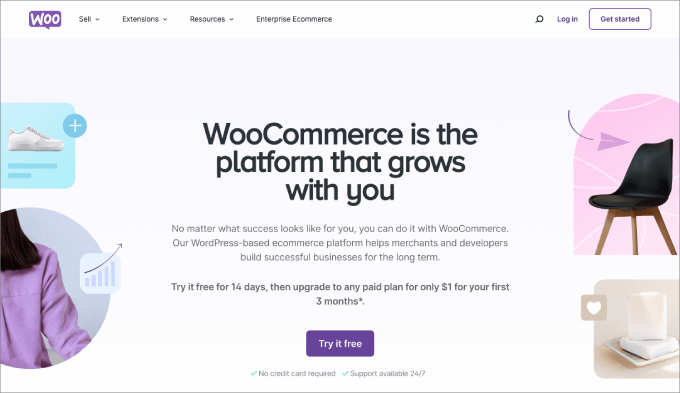
WooCommerce is the best eCommerce alternative for creators who are ready to leave Etsy and grow their businesses. It works alongside WordPress, so it’s also the perfect choice if you want complete control over your online store. WordPress lets you customize every aspect of your site and use plugins to extend its functionality.
I have tons of experience using WooCommerce to help our readers and clients build online stores, and I love it. For more information, see our full WooCommerce review.
WooCommerce is my top pick because it offers a beginner-friendly setup and intuitive store management features. Plus, migrating your shop from Etsy to WooCommerce is seamless because it offers a beginner-friendly product editor for adding items.
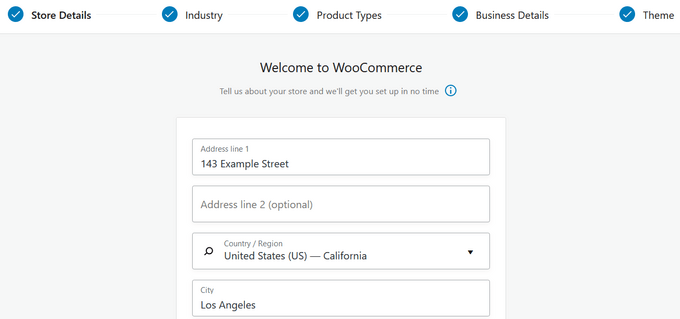
One of my favorite things about WooCommerce is that it offers a full suite of resources and tools to help make your online store match your brand. On the other hand, Etsy makes it hard to stand out from competitors.
If your store looks like everyone else’s, buyers will treat your unique items as a basic commodity. But that’s not the case with WooCommerce.
You can use WordPress’ native tools, including the block editor and the full site editor, to easily build your perfect eCommerce site. You can also use a beginner-friendly page builder like SeedProd.
I also appreciate that you can choose which payment gateways to accept, create pop-up campaigns to get visitors to stay, optimize SEO for increased traffic, add one-click upsells, and much more.
Here’s an example of a website built entirely with WooCommerce.

Notice how clean the design is and how the buttons are strategically placed to make adding to the cart easy.
I also like how WooCommerce keeps everything in one place. This way, you don’t have to juggle between different platforms to run your business. You can manage everything right from your WordPress dashboard.
When you use WordPress with WooCommerce, you can easily run a companion blog, edit your website content, and manage your orders, all without switching screens. It’s less confusing, and you’ll have to pay for fewer subscriptions.
You may also want to check out our list of the best WooCommerce plugins for your store.
✅Pros of WooCommerce:
- Complete ownership of your store and customer data
- No monthly fees (just hosting costs)
- Lower transaction fees than Etsy (around 2.9% vs 6.5%)
- Unlimited customization options with thousands of themes
- Built-in SEO tools to attract organic traffic
- Extensive library of plugins for any feature you need
- Can handle unlimited products and traffic growth
- Full control over customer communication and marketing
❌Cons of WooCommerce:
- You’re responsible for security and backups
Why I recommend WooCommerce: If you want to create an Etsy-like store with WordPress, then WooCommerce is the way to go. When you choose WooCommerce, you get all the profits. That means Etsy isn’t going to take a cut and eat into your margins.
Plus, the Woo Marketplace offers all kinds of plugins, so you can add any type of feature you’d like to your store. This means WooCommerce is highly scalable and customizable.
2. Easy Digital Downloads
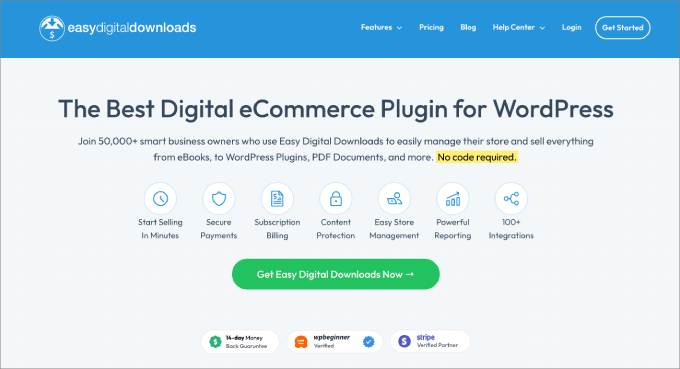
Easy Digital Downloads (EDD) is the best Etsy alternative if you sell digital products like artwork, planners, Canva templates, and other downloadable items.
Many of our partner brands use EDD to sell popular plugins like WPForms and Duplicator, and they love how easily it processes transactions and simplifies store management.
We’ve also written a detailed Easy Digital Downloads review that covers all the features and pricing options.
Like WooCommerce, Easy Digital Downloads is a plugin that works directly in the WordPress dashboard, so you wouldn’t need to bounce between multiple platforms. Everything is in one place, which makes everything convenient.
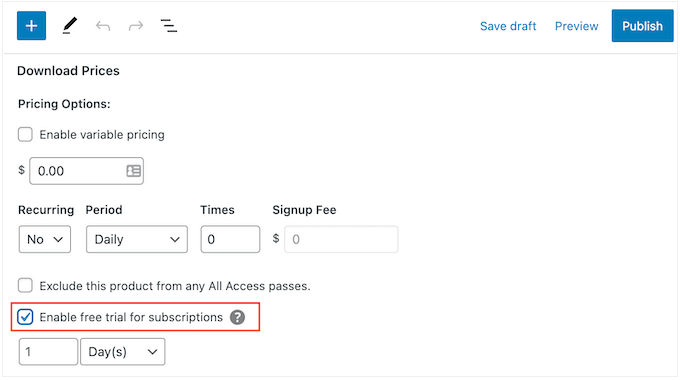
EDD may seem like a less obvious choice, but I’ve included it because Etsy has become popular for selling digital downloads. With EDD, graphic designers and other artists can easily sell their artwork without incurring the costs of printing, packing, and shipping.
On top of that, they’ll also be able to save on those high transaction fees that Etsy charges.
During my testing, I saw how you can easily create and design your producwpages with Easy Digital Downloads. When customers make a purchase, they can automatically access their downloads directly from your site or through email.
For instance, here’s an example product page of a digital download products page using EDD.
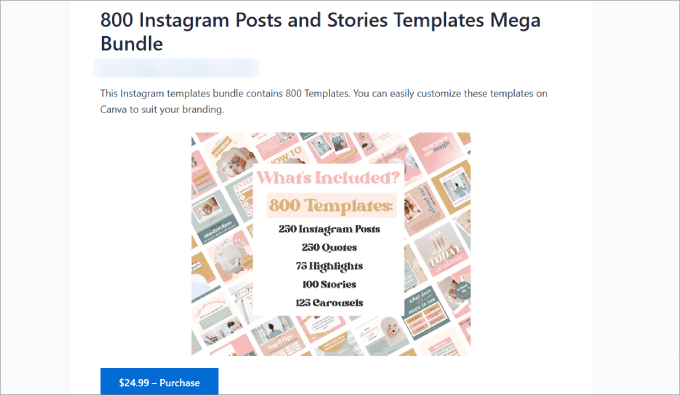
Another nice thing about EDD is that you get to control the entire checkout experience. That means you can allow users to create an account for faster checkouts, add flexible payment options like recurring payments or subscriptions, offer discount codes, and more.
Beyond that, EDD has a wide selection of extensions. For instance, you can connect the plugin to an email marketing service to continually send customers new offers, reminders, and more.
If you plan to use EDD, you may want to check out our ultimate guide on how to sell digital downloads on WordPress.
✅Pros of Easy Digital Downloads:
- Specifically designed for digital products with no physical shipping hassles
- Lower transaction fees compared to Etsy (around 2.9% vs 6.5%)
- Complete ownership of customer data and relationships
- Built-in software licensing and update management for digital products
- Flexible pricing options including subscriptions and bundles
- Detailed sales reporting and customer purchase history
❌Cons of Easy Digital Downloads:
- Limited built-in marketing reach compared to Etsy’s marketplace
- Advanced features not available in the free plan
Why I recommend Easy Digital Downloads: I like EDD as the go-to product for selling downloadable items. With this plugin, users get immediate access to the product. Plus, everything is in WordPress, so you don’t need to go to a separate eCommerce platform.
3. Shopify

Shopify is a popular eCommerce platform with over 2 million merchants selling in over 170 countries. While it isn’t my top choice, it’s a great Etsy alternative if you don’t need much customization and you’d prefer the simplicity of an all-in-one solution for beginners.
In my opinion, Shopify’s main benefit is its plug-and-play user experience. Everything you need is within the Shopify ecosystem.
You can easily get hosting, a domain name, payment gateways, website-building features, marketing tools, order tracking, and much more, all inside the platform.
Plus, I was super impressed by its seller dashboard, which comes with plenty of reporting and analytics. You can see your recent sales and compare them to a previous time period.
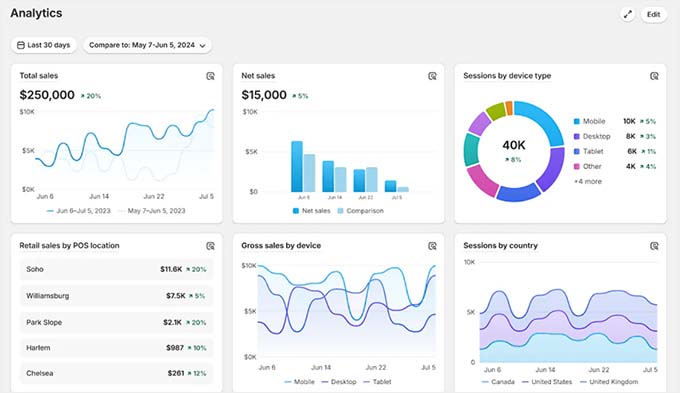
Shopify even has a built-in tool for adding discounts. You can create automatic triggers for discounts based on a certain product, link, or seasonal promotion without writing code.
The tool also lets you set a percentage, fixed amount, or “buy X, get Y” type of discount as well.
You can also view other valuable metrics like your store’s average order value, compare how well your sales channels are performing, and monitor where your visitors are coming from.
✅Pros of Shopify:
- Super beginner-friendly with no technical setup required
- Professional themes that make your store look polished
- Built-in payment processing with multiple payment options
- Extensive app store for adding functionality
- Lower total fees than Etsy for most sellers
- Excellent mobile responsiveness across all themes
- 24/7 customer support available
❌Cons of Shopify:
- Transaction fees on top of payment processing costs
- Less customization flexibility than WordPress solutions
Why I recommend Shopify: It’s hard to go wrong with Shopify since it’s such a trusted and well-known brand in the eCommerce industry. It’s an all-in-one, beginner-friendly platform that gives you all the marketing and selling tools you need to scale your online store.
4. eBay
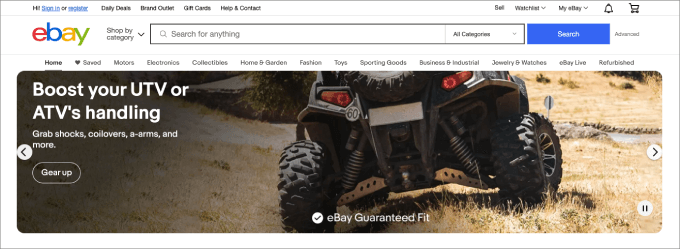
If you want to sell your goods at auction, then eBay is a great alternative to Etsy. This way, you still get all the benefits of an eCommerce marketplace, and you unlock even more profit potential.
eBay is an especially appealing option if you sell rare or collectible items since many people use it to look for these types of goods.
While you don’t get to fully customize your storefront like with WooCommerce or Shopify, you do get to take advantage of their existing audience, which has over 134 million active buyers. The platform has a wide global reach, which only ranks second to Amazon.
The biggest selling point for eBay is its auction feature. In my experience, this makes it a great platform for one-of-a-kind items. These are products that have a limited quantity, which further drives up demand.
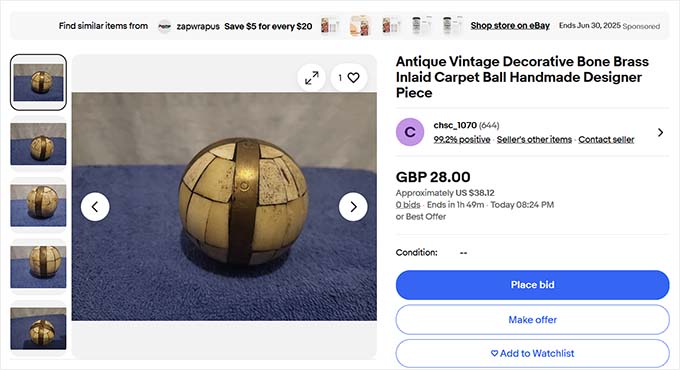
You can use the auctions to capture the highest bidder. And, you can sell your goods more effectively by creating a sense of urgency with a countdown timer.
With eBay, buyers and sellers also get protection, which helps prevent scams. This means the platform will help mediate any difficult situations between you and your buyers. This can also give buyers the confidence to shop on eBay since they know they’re always backed by its protection policies.
✅Pros of eBay:
- A massive global audience of 180+ million active buyers
- Excellent for collectibles, vintage items, and rare products
- Built-in international shipping solutions
- Detailed seller analytics and optimization tools
- Best Offer feature increases conversion rates
- Strong buyer protection builds trust
❌Cons of eBay:
- eBay has a clunky interface
- Complex fee structure can be confusing initially
- Less suitable for consistent product lines
Why I recommend eBay: eBay is a great alternative to Etsy, especially for collectible or rare items. In comparison, Etsy is better for handmade goods. That said, eBay’s auction feature and built-in SEO are helpful for getting more eyeballs on your products and boosting revenue.
5. Wix
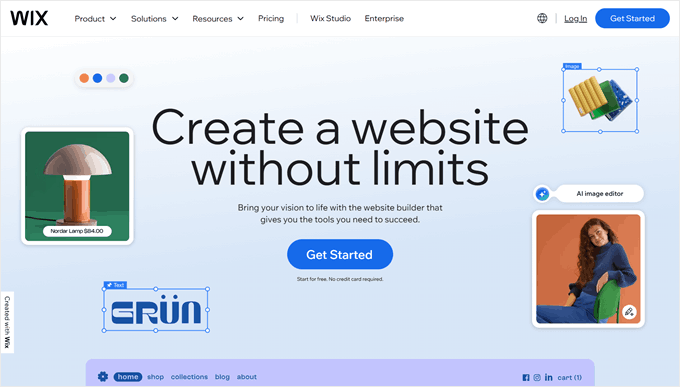
Wix is a website builder designed with beginners in mind, so if you don’t need a lot of customization and don’t want to spend time learning a tool, it may be a good choice for your online store.
It also integrates seamlessly with eBay, Amazon, and Etsy, so it’s ideal if you simply want to expand to additional marketplaces.
The nice thing about Wix is that it’s very user-friendly and offers a drag-and-drop editor. During my research, I also found that it has over 900 beautifully designed templates spanning just about every business type imaginable, from online stores to bold portfolios.
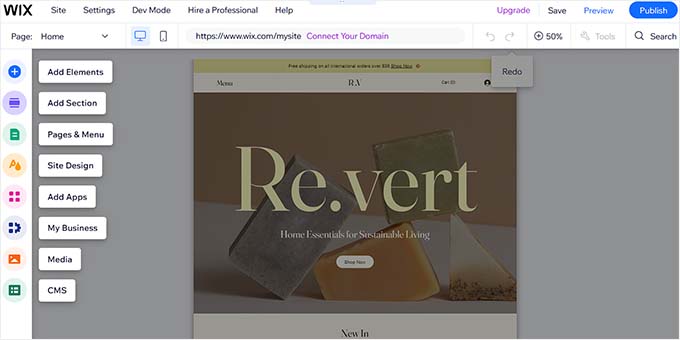
Another advantage of using Wix is that it’s built with performance in mind. One of the key factors for improving SEO is your website speed.
Wix does a great job of ensuring that all web pages load quickly thanks to a globally distributed CDN and data centers.
I also like that all Wix sites are optimized for core web vitals as well to maintain top-notch speeds. Plus, they include multi-cloud hosting services to avoid site crashes, so your customers will never experience a disruption when trying to place an order.
Wix also easily connects to most online marketplaces, including eBay, Amazon, Etsy, and others. So, rather than sticking to one platform, you can use multichannel selling to reach new audiences and boost sales.
✅Pros of Wix:
- Multi-channel selling to Facebook, Instagram, Amazon, and Google
- No transaction fees beyond payment processing
- Built-in SEO tools for better search visibility
- Mobile-responsive designs that work on all devices
- Integrated email marketing and social media tools
- 24/7 customer support available
- App market for additional functionality
❌Cons of Wix:
- Limited advanced eCommerce features compared to dedicated platforms
- Can become expensive with premium apps
Why I recommend Wix: While Wix doesn’t compare to WordPress, it is still a great platform for beginners. Since it connects with multiple online marketplaces, you can easily upload products from Wix to Etsy or eBay. This can allow you to scale your business with less hassle.
6. Amazon Handmade
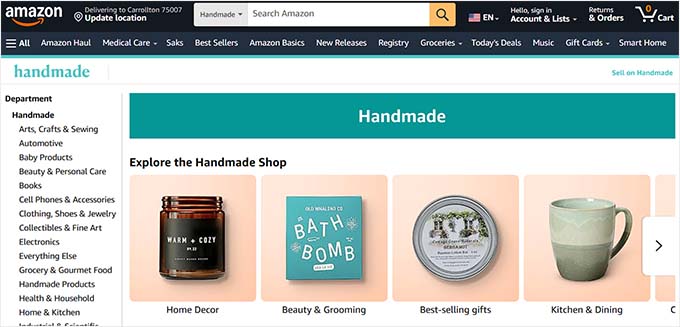
Amazon Handmade is arguably the biggest direct competitor to Etsy. It stands out as a good alternative if you are looking for a large audience, reduced seller fees, or a fulfillment option.
The fulfillment program, in particular, makes it especially appealing if managing shipping is stopping you from growing your sales.
During my research, I discovered that Amazon Handmade is an artisan-only section of the marketplace dedicated to selling handmade products. Here, you can sell personalized items rather than mass-produced products.
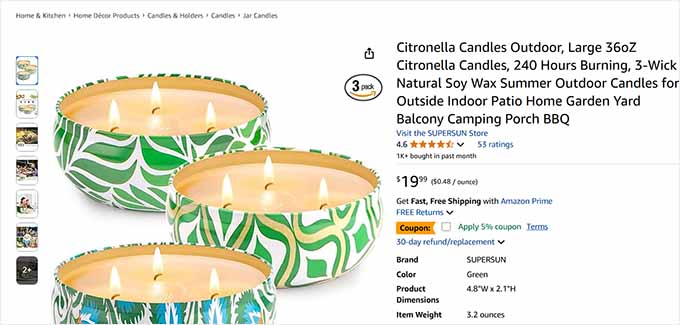
The beauty of Amazon Handmade is that you get to tap into the largest online retailer in the world, boasting over 2.7 billion web visits per month. With such a massive potential reach, your audience may even become global.
But in my opinion, the lower seller fees are an even bigger advantage. I found that there are no listing fees, so you have the opportunity to profit more. In fact, 33% of Amazon Handmade sellers have profit margins above 20%.
Plus, you get to use the FBA (Fulfillment by Amazon) model. This is where you send your products in bulk to Amazon’s warehouses. From there, they handle all the shipping, packing, and labeling, so you don’t have to. With 2-day free shipping for Prime members, you ensure a great customer experience right off the bat.
✅Pros of Amazon Handmade:
- Access to Amazon’s massive customer base of millions of active shoppers
- Lower seller fees compared to Etsy
- Fulfillment by Amazon (FBA) handles storage, packing, and shipping
- Built-in customer trust from Amazon’s reputation
- Powerful search and recommendation algorithms drive traffic
- No monthly subscription fees for individual sellers
- International marketplace reach in multiple countries
❌Cons of Amazon Handmade:
- Strict application process – not all sellers get approved
- Limited customization and branding opportunities
- High competition from other handmade sellers
Why I recommend Amazon Handmade: If you’re unhappy with the Etsy platform, Amazon Handmade is an easy switch. It’s a direct competitor and offers pretty much everything you get from Etsy except lower fees and a better fulfillment process.
7. Big Cartel
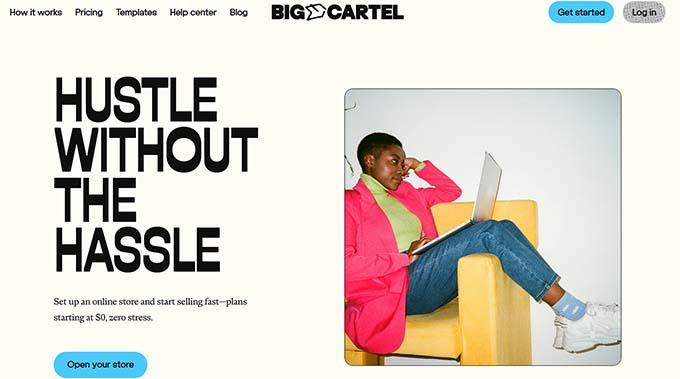
Big Cartel is an eCommerce platform designed for creative and artistic sellers in particular. Powering over 83,000 online stories, Big Cartel is an affordable option with customizable capabilities.
In my opinion, the best part of Big Cartel is the ease of navigation and use. You don’t need lots of experience building websites to get started.
During my research, I found that it comes with a variety of free templates, so you never have to start from scratch. The pre-made website themes also suit lots of different niches like artists, creatives, bloggers, photographers, and more.
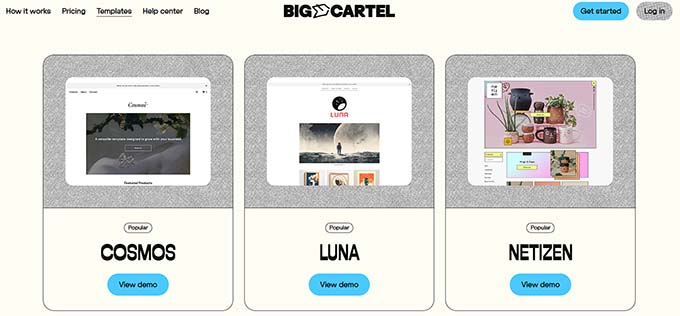
What makes Big Cartel unique is that it also offers live classes aimed to help you set up the basics. That way, you’re not left in the dark trying to figure it out on your own.
An instructor walks you through every step in a session recording so you’ll know how to set everything up. This includes adding products, creating discounts, and packaging your goods.
✅Pros of Big Cartel:
- Designed specifically for artists and creative professionals
- No transaction fees – only payment processing costs
- Simple setup process with professional results
- Clean, modern themes that showcase creative work beautifully
- Excellent mobile responsiveness
- Affordable paid plans for growing businesses
- Built-in inventory tracking and order management
❌Cons of Big Cartel:
- Fewer advanced features compared to larger platforms
- Limited customization options compared to WordPress solutions
- Smaller customer support team
- Less suitable for high-volume sellers
Why I recommend Big Cartel: Big Cartel gives you the basic tools you need to get the job done. It’s also highly straightforward, making it great for artists who would rather spend more time on their art. Plus, it offers a free plan, making it ideal if you’re on a tight budget.
8. Redbubble
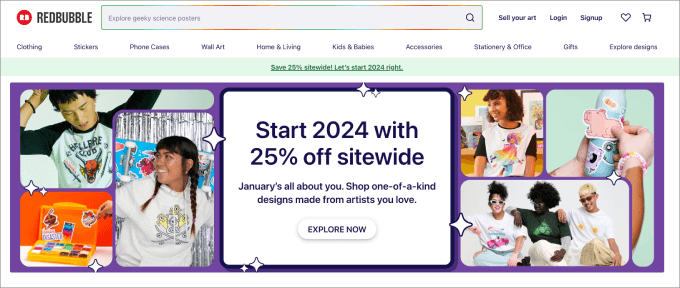
Redbubble is a great Etsy alternative if you are mostly focused on print-on-demand products. Like Amazon Handmade, it can also handle the fulfillment side of things for you.
Print-on-demand items are usually designs printed on products like t-shirts, mugs, socks, hats, and other product categories. They’re more on the mass-produced side but still appeal to niche audiences.
If your Etsy goods fall under the print-on-demand category, then Redbubble is an excellent choice. It has a wide product category with over 70 product types like wall art, gifts, clothing, and more.
The audience size isn’t anything to scoff at, either. My research revealed that Redbubble gets over 40 million monthly site visitors.
It works by allowing you to upload your original designs to the platform. Then, they’re listed for sale based on the product category you choose. If you’re not keen on brand promotion or running ads, you can simply optimize your listings on Redbubble and watch the sales come rolling in.
Plus, I really appreciate that Redbubble automatically prints, packs, and ships all orders directly to customers. That means you don’t have to worry about the fulfillment side of things.
✅Pros of Redbubble:
- Zero upfront costs or inventory investment required
- Complete hands-off fulfillment – no printing, packing, or shipping
- Massive global customer base actively browsing for designs
- Wide variety of products to apply your designs to
- Automatic international shipping and currency handling
❌Cons of Redbubble:
- Lower profit margins compared to selling directly
- No control over customer relationships or data
- Limited customization of product presentation
Why I recommend Redbubble: If you want to sell custom t-shirts, mugs, or anything where you print designs on products, then Redbubble is the place to go. Just upload your design and optimize your listing, and that’s it! There’s not a whole lot of work to it.
9. BigCommerce
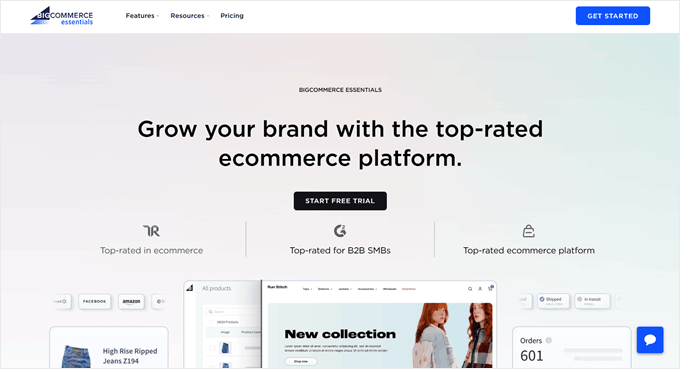
BigCommerce is a good alternative to Etsy because it’s a fully hosted eCommerce website builder that is suitable for both beginners and advanced users. It comes with a bunch of essential features for a quick start and comes with high-performance functionality to help you grow your store.
On the plus side, BigCommerce has a wide range of paid themes, and its page builder makes it easy to design your store however you like. During testing, I found that it offers plug-and-play widgets, so you can add social media profiles, testimonials, upsell buttons, countdown timers, etc.
One cool design feature is swatches that allow users to hover over product images for instant zoomed-in views. This creates a better user experience since you can instantly view products without landing on the product page.
Also, BigCommerce has comprehensive checkout features to help boost conversion rates. For example, you can create customer logins, add progress bars, and even show all the available shipping methods.
While researching, I discovered that BigCommerce even has a built-in abandoned cart recovery system. This allows you to send automatic emails to customers who exit your store without completing their purchases.
✅Pros of BigCommerce:
- No transaction fees on most plans (unlike Etsy’s 6.5%)
- Built-in advanced features like abandoned cart recovery and customer segmentation
- Strong built-in SEO features for organic traffic growth
- Multi-channel selling to Amazon, eBay, Facebook, and Google
- Professional themes with mobile responsiveness
❌Cons of BigCommerce:
- Steeper learning curve compared to simpler platforms
- Theme customization requires more technical knowledge
Why I recommend BigCommerce: BigCommerce is a useful alternative to Etsy. It’s similar to WooCommerce and Shopify because you get full control over how your online store looks, and you customize the entire buying experience. But it still doesn’t have as many apps and advanced SEO features as those two platforms have.
What Is the Best Etsy Alternative?
In my expert opinion, WooCommerce is the best Etsy alternative if you plan to sell physical products because it is beginner-friendly, has numerous customization options, and is super scalable.
However, if you sell digital goods, then Easy Digital Downloads is the way to go. It’s specifically designed for selling digital items and has all the necessary features.
On the other hand, I recommend eBay for selling collectibles and unique items that could be auctioned off at a higher price.
Similarly, Redbubble is a great choice for users who plan to sell print-on-demand products because the platform prints, packs, and ships all orders to customers directly.
Frequently Asked Questions About Etsy Alternatives
Here are some of the most frequently asked questions about Etsy alternatives.
What’s the best alternative to Etsy?
There isn’t a one-size-fits-all answer, but I like WooCommerce for selling physical goods and Easy Digital Downloads for digital products.
How do you sell art without Etsy?
Easy Digital Downloads allows you to sell custom printable art. When a customer places an order, they’ll land on an order page where they can directly download the product. You can also send a copy of the file via email.
Alternatively, if you want to sell physical artwork, you can create an online store using WooCommerce.
What is the best site to sell handmade items?
WooCommerce makes it easy to sell handmade items because you can create product pages. You can customize the design of your online store to match your brand. Plus, you can always connect it to other software to add more functionality, like OptinMonster for adding pop-ups, SeedProd for thank you pages, and FunnelKit for one-click upsells.
Related Guides: Etsy Alternatives
I hope this article helped you discover the best Etsy alternative so you can start selling your handmade and custom goods. You might also be interested in these related guides:
- Ways to Increase WooCommerce Sales (Actionable Tips)
- Best Shopify Alternatives (Cheaper and More Powerful)
- How to Create an Etsy-Like Store with WordPress (Step by Step)
- How to Create an Online Marketplace Using WordPress
- Profitable Ecommerce Business Ideas for WordPress (Expert Pick)
- Best Wix Alternatives (More Powerful and Reliable)
- How to Make a Multi Vendor Ecommerce Website with WordPress
If you liked this article, then please subscribe to our YouTube Channel for WordPress video tutorials. You can also find us on Twitter and Facebook.





Arafath Ahmed
Thanks for sharing this comprehensive guide on Etsy alternatives! As an Etsy seller myself, I’ve been feeling the pinch of rising transaction fees and increased competition lately. Exploring other platforms seems like a smart move to regain control over my business and customer data. I appreciate the breakdown of various alternatives provided in the article. Each platform seems to cater to different needs and product types, which is helpful for sellers like me who offer handmade goods. WooCommerce looks like a promising option, especially with its seamless integration with WordPress and customizable features.
Dennis Muthomi
I’ve always used WooCommerce for my online store ever since I first started selling tshirts.
being free and integrated with WordPress made it an easy choice.
but I’m really excited to try out Easy Digital Downloads for my upcoming e-book release for my other niche site that I have been working on

this roundup of Etsy alternatives is so helpful as my business expands into digital products.
Thank you for putting together this valuable list of options!!
Kushal Phalak
Nicely written! I have tried selling on Etsy, and it is not profitable unless you have something unique that has a market, otherwise most categories on Etsy are saturated and has tremendous competition. Moreover the fees(listing + transaction, etc.) do cut out profits. Happy to see some alternatives, but if I had to pick, I would definitely pick platform like eBay, or Amazon, as it already has traffic. When you create your own store on Shopify, for example, you need to invest more in marketing than the ones which already have traffic.